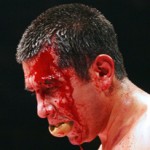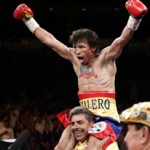The Dangers of Being A Narcissist
A few months back I penned an article focusing on the upside that new media has presented the boxing industry. I encouraged athletes and fans alike to embrace new media (Twitter, Facebook, Ustream, YouTube, etc.) and realize the potential these outlets possess to help keep the fistic flame alight while traditional media continues to sweep boxing under the rug. While I wrote almost exclusively about new media’s upside, I only scratched the surface when describing the potential dangers that it presents athletes — citing an ill-advised tweet by Andre Berto calling women “motherf***ers” after Edwin Valero killed his wife, then himself.
However, last week, with one ten minute racist and homophobic rant, Floyd Mayweather exemplified the dangers that new media presents to athletes.
“We’re going to cook that little yellow chump…Once I stomp the midget, I’ll make that motherf***er make me a sushi roll and cook me some rice,” Mayweather said about the Filipino Congressman, Pacquiao.
He continued, “Step your game up, f****t…That mother f***er Pacquiao, he can’t speak no English…Mother f***er signed with two companies. Look it up. And then this mother f***er with Nike only got 70 Gs. How stupid can a mother f***er be? Reebok gave me a million dollars for three weeks. I wore Reebok s**t for a week for a million dollars. This mother f***er’s name is Emmanuel. He got a fake name, taking power pellets.”
The following day Mayweather issued an apology in which he claimed he was just “having fun.”
The National Federation of Filipino Americans Association rejected Mayweather’s apology and issued a powerful statement condemning PBF’s “uneducated” remarks.
“This disgusting diatribe against Pacquiao is a racial slur against all Filipinos and Filipino Americans and an embarrassment not only to the boxing community, but to all Americans,” said Greg Macabenta, the National Federation of Filipino American Associations (NaFFAA) national chairman in a statement.
In addition to the backlash Mayweather has received from the Filipino community, there are also various petitions circulating online aimed at alerting adidas and Reebok that the companies stand to lose customers if they do not reprimand their client.
When thinking of the dangers new media presents public figures, I could only think of one analogy. Guns don’t kill people, people kill people.
Similar to the way that guns can serve as collector’s items as opposed to weapons, new media can be used as a promotional tool, or a platform to broadcast hateful messages. Unfortunately for Mayweather, he logged onto Twitter to direct fans to his Ustream page where they witnessed a cringe-worthy tirade against Pacquiao and all Filipinos.
While the immediate reaction was and still is one of disgust, it is not necessarily one of shock. Mayweather’s narcissistic attitude has been well-documented, whether it be through interviews, news stories, or even HBO’s 24/7. He lives a lavish lifestyle and flaunts his money and material items whenever he gets the chance. Since new media removes traditional communication barriers between public figures and the general populous, it is the responsibility of the public figure to create his or her own filter,and understand the raw access that new media provides.. New media websites such as Twitter allow individuals to broadcast messages without anyone telling them what to do or say. All who participate in social media websites are responsible for their own words and actions — anything that is written or said can potentially reach millions of eyes and ears.
The less-than-humble Mayweather occasionally allows for a sneak peek into his lavish lifestyle by posting pictures on his Twitter page. By doing so, he also exposes his disconnect with the world around him — especially to boxing fans, who have historically been a blue-collar group.
In the past two weeks alone, Mayweather has posted pictures of himself standing next to his Cadillac golf cart, a picture of himself holding a luxurious watch in front a briefcase full of banded $100 bills (which until then I only thought existed in movies), and a picture of himself posing in front of a large portrait of…HIMSELF.
Considering that most users of new media are teenagers and young adults, Mayweather’s narcissism along with that of celebrities and athletes from other sports, can have a profound impact on the impressionable youth in America and abroad. For example, here are some of the comments on the Mayweather’s twitter pictures:
“Everything you own is the greatest, just like you.”
“You always have stacks of money in your hands.”
“I’m trying to be just like you when I grow up.”
According to Leonard C. Groopman, M.D. and Arnold M. Cooper, M.D.’s work on Narcissistic Personality Disorder, two potential triggers for the disorder are “excessive admiration that is never balanced with realistic feedback” and “being praised for perceived exceptional looks or talents by adults.”
Further, board certified physician and addiction medicine specialist Dr. Drew Pinsky (from Loveline and VH1’s Celebrity Rehab fame) co-authored a book with Dr. S. Mark Young, titled The Mirror Effect: How Celebrity Narcissism Is Endangering Our Families And How To Save Them.
In the book, Dr. Pinsky writes, “I can’t help but conclude that there are many more individuals suffering from unhealthy levels of narcissism than there are patients diagnosed with narcissism as a psychological disorder…Another reason Narcissistic Personality Disorder (NPD) can be difficult to diagnose is that narcissism, even at NPD levels, doesn’t stop people from attaining positions of power, wealth, or prestige. Narcissists often develop attractive or persuasive social skills to help them maintain the persona they have constructed to get what they want from the world.”
Pinsky continues with a revealing fact, “Any challenge to a narcissist’s unrealistic self-image is likely to provoke rage, disdain, denial or other protective behaviors, as the individual struggles to protect the pseudo-self at all costs.”
Perhaps the backlash and disappointment aimed at Mayweather after he refused to accept Pacquiao’s latest challenge humbled Mayweather a bit and made him resort to taking cheap-shots and name-calling.
Whatever the reason for Mayweather’s rant — whether he truly believes the things he said or if he was just “having fun” — it all can be traced back to a lack of filter – a lack of filter that is a common trait found in most narcissists.
When you feel that you don’t have to answer to anyone, you are more willing to speak what is on your mind. Most of the time, new media can act as a positive vehicle for the athletes that use it — giving them the opportunity to share their story and connect with fans on a human level — without managers and publicists intervening. For the most part, boxers on Twitter have understood and embraced this concept. I hope to see more boxers join new media sites and allow fans to interact with them on levels that were nonexistent even five years ago.
I further hope that Mayweather’s rant on Ustream won’t discourage other athletes from joining new media websites, as I truly believe it can be integral part of boxing’s future. In addition, I think it is important to take what Mayweather says with a grain of salt. You can make of it what you want, but I’ll stick to my gun analogy.
Similar to guns, the potential for new media to be used as both a force of good and evil exists. However, it is important to remember that new media doesn’t harm people, narcissistic people exposed by new media harm people.
You can take Dr. Drew Pinsky’s Narcissistic Personality Test here. The average score for non-celebrities is 15. www.jimpham.com/2009/04/dr-drews-narcissism-test.html
You can follow Kyle Kinder at Twitter.com/KyleKinder

